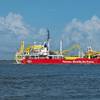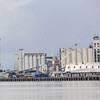Vessel Backlog at Panama Canal
The Panama Canal continues to experience high vessel backlog.
This is attributed to several reasons, such as:
* INCREASED ARRIVAL OF LARGE AND DEEP DRAFT VESSELS: These larger vessels and those with deeper drafts, besides having more restrictions than small, light draft vesse;s, require more time to transit the locks, thus reducing the total number of vessels that may be scheduled for transit in a day. The average percentage of “supers” transiting per day has increased to more than 74% as of October 2014.
* WATER CONSERVATION MEASURES AND LOW GATUN LAKE LEVELS DUE TO EL NINO PHENOMENON: Gatun Lake, which supplies water for Canal operations, not only has bad water levels below what is expected for the entire current year 2015, but has also registered some of the lowest levels, not seen since the beginning of Canal operations in 1914. Although the lake level is presently rising, the current levels are still more than three feet below the average for this time of the year. An effect of the low level of Gatun Lake is also an increased lockage process time.
* FOD AT THE CANAL: Although fog is not uncommon for this time of the year, it can negatively impact transit operations. During the past month of October 2015, the transits of 107 vessels were delayed due to episodes of fog.
The Panama Canal has implemented several measures to reduce the number of vessels awaiting transit, such as:
- Postponement of scheduled non-critical maintenance work at the Locks
- Change in Booking conditions
- Assignment of additional equipment and crews for tugs, locomotives and locks.
Despite all these measures, the in-transit time (currently averaging 12.233 hours), the number of vessels awaiting transit, and the waiting time for many of these vessels have not been reduced to acceptable levels. Although there have been three vessels that had 11 days of waiting time, 96% of vessels have waited eight or less days for transit, and 36% of those have waited four or less days. The usual waiting time for “regular” non-booked vessels does not normally exceed three days, while for non-booked “supers” it may reach higher levels.
A temporary suspension of the following booking slots will be implemented until an acceptable level of waiting time is reached:
* Slots for regular available in the third period
* Slots for vessels less than 300 feet in length
* Just-In-Time (JIT) slots for regulars
In accordance with the rules governing the Transit Reservation System, and in addition to Condition 1.a already in effect, these measures will be implemented beginning on booking date November 12, 2015.
The Canal is currently monitoring the situation and analysing all possible measures that would help bring the backlog to normal levels.
Source: Panama Canal Authority Advisory to Shipping No.A-35-2015 dated 8 November 2015












